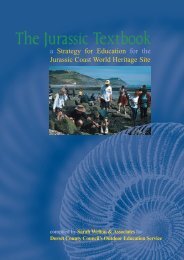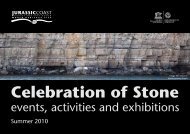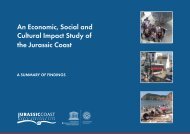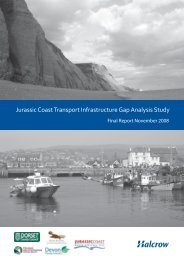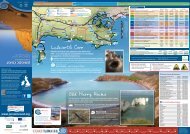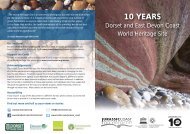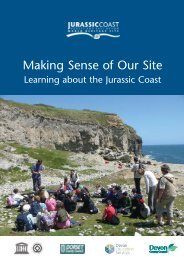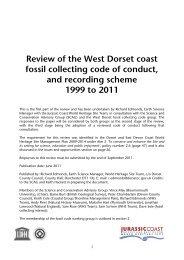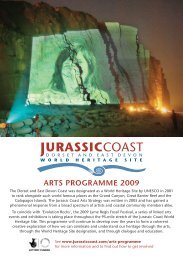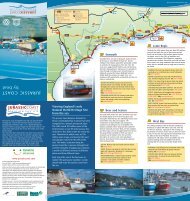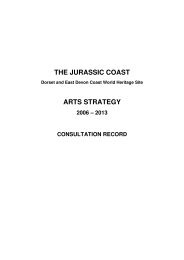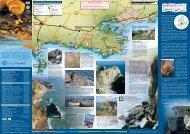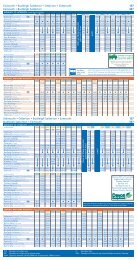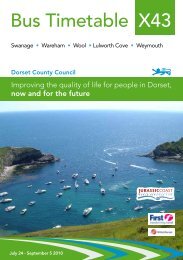Final Report to DEFRA - Jurassic Coast
Final Report to DEFRA - Jurassic Coast
Final Report to DEFRA - Jurassic Coast
Create successful ePaper yourself
Turn your PDF publications into a flip-book with our unique Google optimized e-Paper software.
end of the process, however, when there was greater realisation that coastal change<br />
could have implications for the wider community, this had generally shifted in<strong>to</strong> a<br />
desire for adaptation which met the needs of the whole community, as well as greater<br />
empathy for those individuals with most <strong>to</strong> lose.<br />
Engaging visi<strong>to</strong>rs <strong>to</strong> coastal areas presented a different set of challenges. They<br />
clearly have a stake in the future of the coast, but as visi<strong>to</strong>rs are unlikely <strong>to</strong> want <strong>to</strong><br />
spend <strong>to</strong>o much time thinking about coastal change relative <strong>to</strong> enjoying their visit.<br />
Understanding why visi<strong>to</strong>rs are attracted <strong>to</strong> the coast is clearly important, however,<br />
and the answers are not always obvious. For example, Swanage is a traditional<br />
seaside resort with sandy beach which many visi<strong>to</strong>rs are unaware is the product of<br />
fairly recent engineering interventions. At the start of the engagement process, the<br />
prevailing view in Swanage was that the <strong>to</strong>wn would have nothing <strong>to</strong> offer should the<br />
beach be lost. As the process continued, it emerged that a study had shown that the<br />
beach was just one of a large number of reasons why people visited the area.<br />
This example illustrates the importance of coastal areas understanding the visi<strong>to</strong>rs<br />
who often make up such an important part of their economy, both <strong>to</strong> inform how they<br />
market themselves <strong>to</strong> visi<strong>to</strong>rs, and <strong>to</strong> inform adaptation planning for the future. An<br />
undue focus on beach <strong>to</strong>urism when a beach may in any case be thinned or lost<br />
would clearly be inappropriate, and hope that there is a wider realisation of this in<br />
places like Swanage as a result of the Pathfinder process.<br />
Persuading the silent minority <strong>to</strong> make itself heard<br />
The Pathfinder Education project produced a revealing piece of anecdotal evidence<br />
in terms of the risks and costs faced by the owners of threatened properties. Schools<br />
interviewed a number of property owners by effectively door-stepping them. Some of<br />
these people said that although eventually losing their property was obviously a<br />
concern, they accepted that they could not resist natural processes and they did not<br />
really expect anything <strong>to</strong> be done about it. One even said that it would be ‘a bit<br />
selfish’ <strong>to</strong> expect defences <strong>to</strong> be built around her home.<br />
This attitude was also reflected by one of the coastal businesses represented in one<br />
of our workshops. A holiday park owner said that some time ago he recognised that<br />
he would ultimately face the loss of his land <strong>to</strong> erosion and at that point made a<br />
conscious decision <strong>to</strong> treat the business as if he was a leaseholder rather than a<br />
freeholder. Although this involved changing nothing more than his state of mind, it<br />
had proved beneficial, allowing him <strong>to</strong> make appropriate investment decisions, and <strong>to</strong><br />
plan for eventual loss rather than resisting the inevitable. He did, however, suspect<br />
that he was fairly unique in taking this attitude.<br />
Hearing such views in a workshop context challenged some of the accepted wisdoms<br />
about where responsibility for managing coastal change really sits, and illustrated<br />
how individuals and businesses can also take responsibility for themselves.<br />
4.2 Lessons for the <strong>Jurassic</strong> <strong>Coast</strong> Pathfinder project team – would we have<br />
done anything differently?<br />
With the benefit of hindsight, there are a number of changes which we might have<br />
made <strong>to</strong> the project <strong>to</strong> improve its effectiveness. These are summarised below.<br />
29



